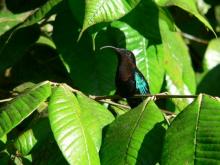A reminder of needs
The overseas territories are home to a stunning array of biodiversity. They also have specific geographical, biological, ecological, and sometimes even legal features that must be taken into consideration to improve the management of their natural areas.
Managers of overseas natural areas require the appropriate means and specific skills to cope with poaching, wildlife trafficking, illegal gold mining, invasive species, inadequate knowledge of conservation issues, the development of tourism, and the effects of climate change, on the one hand; and their isolation and limited financial resources, on the other.
Meanwhile, training, experience sharing, and cooperation are often lacking and networking proves to be complicated due to the remoteness of these areas.
1 Overall objective
The overall objective of Te Me Um is to strengthen the capacities of overseas protected area managers, within each local authority, and regionally via the creation of a network that will facilitate exchanges.
5 Specific objectives / the Interest of Te Me Um
- promote the professional needs of managers and related stakeholders (vis-à-vis local stakeholders and the managers themselves);
- bring closer together the stakeholders who manage overseas natural areas (particularly those in local authorities). Requirement: there must be dynamic exchange among local stakeholders. If there is a lack of synergy, remediation action must be conducted.
- carry out/push for concrete actions in the field such as concertation, and try to identify positive impacts at every level;
- contribute to perpetuating the job positions of stakeholders involved in the management of overseas natural areas;
- act in response to local expectations.
5 expected results
- R1 = Local integration, uptake and implementation: local stakeholders react, participate, and even back local activities; there is an active network of local stakeholders who can be mobilised, and the network is well-established.
- R2 = Contribution to the permanent establishment of natural area manager jobs, and strengthening their missions
- R3 = Perpetuation of Te Me Um programme actions
- R4 = Communications on management actions, notably actions stemming from Te Me Um
- R5 = Development of the skills of natural area managers and related stakeholders
4 Lines of work
They correspond to a thematic grouping of the projects implemented
- 1. Develop local skills of management teams and related stakeholders.
- 2. Assist in seeking and diversifying sources of funding (this is one of the main priorities for capacity building).
- 3. Provide support for territorial integration and recognition of the socio-economic value of natural areas and ecosystem services.
- 4. Provide support for local, ecoregional, and national cooperation (mutualised information and tools).
